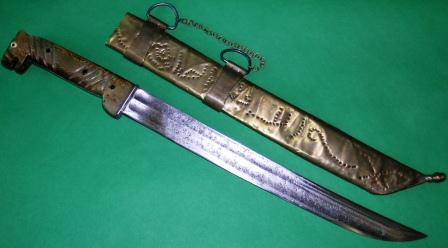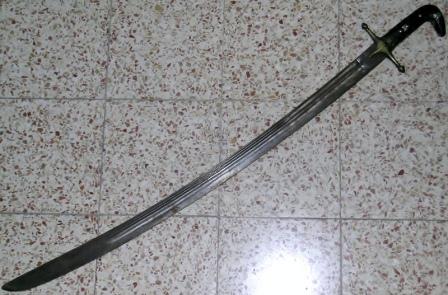Hello, I am new to the site but have been collecting vintage arms (mostly guns) for a while. I acquired this piece a while back and have yet to identify it with any certainty. I am not selling it and just want to know what it is. Any help would be greatly appreciated.
My initial impression is some sort of cut down Turkish or Indo-Persian kilij with some sort of odd piece fitted where the quillons would be ( it seems out of character with the handle ). The scabbard has a bit more of a Turk feel to it.
Thanks for the reply Allan. I was thinking along the same lines. The piece on the handle is copper and seams to have a similar design to the copper on the scabbard. The scabbard is leather and copper over wood. It appears to have some age to it but I don't have enough experience to even make an educated guess. The handle looks to me like a kilij or possibly a boarding saber.
Disclamer: Although many people on this site start assesments with "I am not an expert" most of them are just being humble. I am not, I really do not have any scholarship/trining etc in this area.
That being said, the blade seems to have a reasonably complex set of fullers, and the arangement seems "naval" to me, though how far they exted towards the edge makes me think it is an extensively re-sharpened and shaped blade. The hilt, guard, and scabard look east asian to me. Handle in particular looks like that found on many Kriss.
My theory (fine, spitballing wild hypethisising idea) is that it is am older navel hanger blade that has been salvaged and reshaped and hilted in local style somewhere in the vietnam/indonesia neck of the woods
That being said, the blade seems to have a reasonably complex set of fullers, and the arangement seems "naval" to me, though how far they exted towards the edge makes me think it is an extensively re-sharpened and shaped blade. The hilt, guard, and scabard look east asian to me. Handle in particular looks like that found on many Kriss.
My theory (fine, spitballing wild hypethisising idea) is that it is am older navel hanger blade that has been salvaged and reshaped and hilted in local style somewhere in the vietnam/indonesia neck of the woods
From the photos, you can actually see where when the blade was shortened they just ground right through the fullers which obviously extended further then the current tip of the blade. Can you make out any symbols of figures in the copper guard? How is the guard attached, its hard to tell from the pics? I'm sticking with the converted kijli at this point.
Another possibility... And I'm just throwing this out there because the guard piece reminds me of something I've seen before...
That shape of grip was popular for a while in China during Qian Long's reign (Qing Dynasty- particularly late 18th), and that guard could also easily pass as Chinese. Also, fullers and blade shortening were popular too.
This could almost be a Chinese saber, in a style borrowing heavily from the border neighbours.
I like your sword, mate! NIce one!
That shape of grip was popular for a while in China during Qian Long's reign (Qing Dynasty- particularly late 18th), and that guard could also easily pass as Chinese. Also, fullers and blade shortening were popular too.
This could almost be a Chinese saber, in a style borrowing heavily from the border neighbours.
I like your sword, mate! NIce one!
Thanks guys for helping me figure this out. I was looking at the piece and noticed that the decorative copper piece was just barely hanging on so I removed it to take pictures underneath hoping it would be easier to identify that way. I also noticed that the scabbard leather was stitched with very fine copper wire which seems odd to me. Anyway here are a few more pics. Thanks again for all the help. :D
 Attachment: 196.99 KB
Attachment: 196.99 KB
[ Download ]
 Attachment: 169.28 KB
Attachment: 169.28 KB
[ Download ]
 Attachment: 201.84 KB
Attachment: 201.84 KB
[ Download ]
 Attachment: 185.21 KB
Attachment: 185.21 KB
[ Download ]
[ Download ]
[ Download ]
[ Download ]
[ Download ]
Shortened Turkish shamshir - that complex fullered blade is probably european trade blade (they also exist as localy-made copies, though of lesser quality), that pattern was very popular in the Levant markets and can be found mounted both in Turkish, Syrian and Bedouin fittings. I have a similarly-shortened saber mounted in Bedouin fittings. The bulbous horn handle is strictly Turkish and so is the metal wire stitching of the sheath.
In the photos the shortened saber and a syrian sword mounted with a similar blade.
 Attachment: 24.45 KB
Attachment: 24.45 KB

 Attachment: 40.96 KB
Attachment: 40.96 KB

In the photos the shortened saber and a syrian sword mounted with a similar blade.


Many thanks Sa'ar. That makes perfect sense. What would you guess it's age to be?
Well, to my limited experience with Turkish arms, the metal wire stitching is very time-consuming and old-world technique, usually no older than the mid 19th century. The trade blades can be traced back to the late 18th century so the original sword can be about 150-200 years old. When was it shortened - I cannot say.
Thanks again to everyone for helping me out. I can see that I have a lot to learn as you guys pointed out things I would not have thought of.
Page 1 of 1
You cannot post new topics in this forumYou cannot reply to topics in this forum
You cannot edit your posts in this forum
You cannot delete your posts in this forum
You cannot vote in polls in this forum
You cannot attach files in this forum
You can download files in this forum
All contents © Copyright 2003-2006 myArmoury.com — All rights reserved
Discussion forums powered by phpBB © The phpBB Group
Switch to the Full-featured Version of the forum
Discussion forums powered by phpBB © The phpBB Group
Switch to the Full-featured Version of the forum